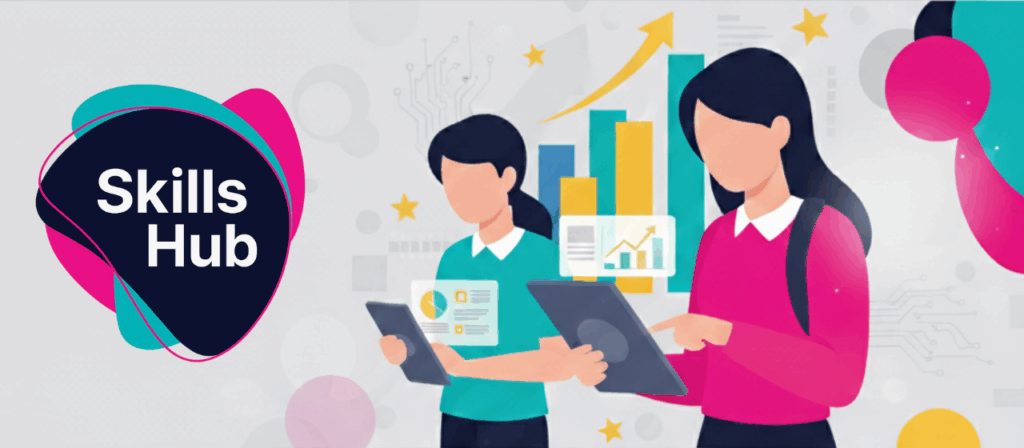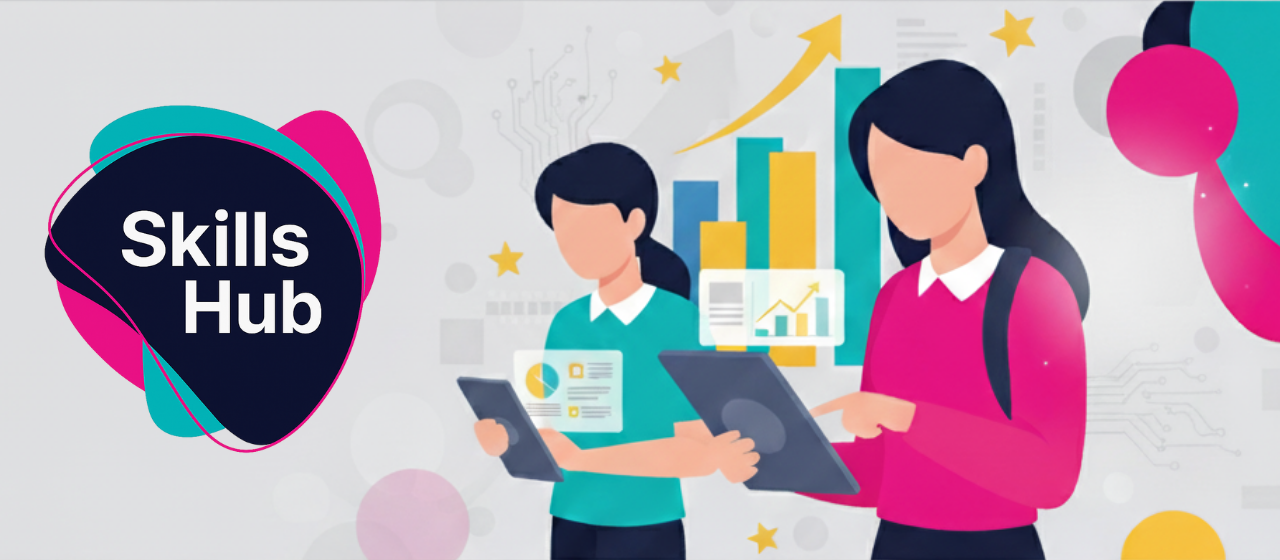The AI Revolution Is Here – Is Your Child Ready?
The world of work is changing at an unprecedented pace. According to a 2025 report by PwC, approximately 18% of jobs in the UK are at a high probability of automation in the coming years [1]. However, this technological shift is not just about job losses; it’s about a fundamental change in the skills that employers value most. While artificial intelligence can perform routine tasks with incredible efficiency, it cannot replicate the uniquely human abilities that drive innovation, leadership, and strategic thinking.
For parents, this raises a critical question: in a world where the World Economic Forum estimates that 85% of the jobs that will exist in 2030 haven’t been invented yet [2], how can you prepare your child for a future that is still unfolding?
The Unassailable Skills: What AI Can’t Do
As AI handles the repetitive and predictable, the demand for higher-order cognitive and emotional skills is soaring. Research from McKinsey Global Institute predicts that the need for social and emotional skills will grow by 26% by 2030, while the demand for higher cognitive skills will increase by 19% [3]. These are the abilities that will define the successful careers of the next generation. The table below outlines the key skills that are becoming more valuable in the age of AI.
| Skill Category | Description |
| Complex Problem-Solving | The ability to analyse multifaceted business challenges, develop creative solutions to novel problems, and integrate diverse information sources. |
| Critical Thinking & Analysis | The capacity to evaluate competing strategies, question assumptions, identify biases, and make sound judgments with incomplete information. |
| Emotional Intelligence & Leadership | The skill of managing stakeholder relationships, negotiating win-win solutions, and inspiring and motivating teams. |
| Creativity & Innovation | The ability to identify new market opportunities, develop breakthrough business models, and adapt to rapidly changing environments. |
| Strategic Decision-Making | The competence to balance short-term and long-term objectives, manage risk and uncertainty, and coordinate complex organizational systems. |
These are not just abstract concepts; they are practical business skills. And they are precisely the skills that our education system must now prioritise.
The UK’s Skills Gap: A Crisis and an Opportunity
The challenge is that the UK is already facing a significant skills shortage. The government’s Employer Skills Survey for 2024 revealed that 27% of all job vacancies in the UK are due to a lack of skilled applicants [4]. That’s over 210,000 jobs that businesses are struggling to fill because they can’t find people with the right capabilities. The survey also found that 12% of employers report that their current staff lack full proficiency in their roles, highlighting a widespread skills deficit across the workforce.
This gap between the skills employers need and the skills the workforce possesses creates a huge opportunity for young people who can develop these in-demand abilities early on. Students who cultivate skills in complex problem-solving, critical thinking, and strategic decision-making will have a substantial competitive advantage in the job market.
From the Classroom to the Boardroom: A Practical Pathway
For many parents, the idea of teaching these complex skills can feel daunting. How can you help your child develop strategic thinking or emotional intelligence? The answer lies in moving beyond traditional, passive learning methods and embracing active, experiential learning.
Research consistently shows that active learning environments, where students learn by doing, are far more effective than traditional lecture-based approaches. A 2024 study by Engageli found that students in active learning environments have 54% higher test scores and are 1.5 times less likely to fail than their peers in passive learning settings [5]. This is because active learning fosters deeper engagement and allows students to apply theoretical knowledge to practical, real-world scenarios.
This is where Skills Hub comes in. Our platform is designed to bridge the gap between academic theory and real-world practice, providing students with a safe space to develop these critical business skills through interactive simulations.
How Skills Hub Develops Essential Skills
Instead of memorizing theories from a textbook, students using Skills Hub step into the role of a business leader and make decisions that have real consequences. For example, in one of our simulations, a student might have to manage a company facing a sudden supply chain crisis. They will need to:
- Analyze the problem: What are the immediate impacts on production, costs, and customer orders?
- Think critically: What are the potential solutions? Should they find new suppliers, change their product mix, or communicate delays to customers?
- Make strategic decisions: How will their choices affect the company’s long-term profitability, brand reputation, and stakeholder relationships?
- Manage stakeholders: How do they balance the needs of angry customers, anxious employees, and demanding shareholders?
Through this process, students don’t just learn about business; they learn how to think like a business leader. They develop the resilience, adaptability, and analytical skills that will be invaluable in their future careers.
The Investment in Your Child’s Future
Developing these essential skills is not a luxury; it is a necessity. The world is changing, and the job market is changing with it. The cost of being unprepared is significant, with workers who lack these future-ready skills facing a 40% higher risk of unemployment [6].
Investing in your child’s skills development now is one of the most important things you can do to secure their future success. For just £10 a month, Skills Hub provides your child with a powerful tool to develop the skills that will set them apart. It is a small price to pay for a lifetime of career opportunities.
Start Building Your Child’s AI-Resistant Career Today
The window for preparation is now. Students who develop these human-centric business skills during their education will have significant advantages throughout their careers.
Start Your Free Trial Now – Transform Your Child’s Business Studies Success Today
Frequently Asked Questions
Q: How do we know which skills will actually be valuable in the future?
A: While no one can predict the future with certainty, research from multiple sources, including the World Economic Forum, McKinsey, and the UK government, consistently identifies the same set of human-centric skills: complex problem-solving, critical thinking, creativity, and emotional intelligence. These skills are timeless and become even more important as AI handles routine tasks.
Q: Won’t AI eventually be able to perform these skills too?
A: While AI is constantly evolving, its current limitations suggest that skills requiring deep human understanding, such as complex stakeholder management, ethical reasoning, and creative innovation, will remain human domains for the foreseeable future. These skills are also highly transferable across different industries and roles.
Q: Should my child still focus on traditional academic subjects?
A: Absolutely. Strong academic foundations are essential. However, business skills enhance performance in all subjects by developing critical thinking, analytical, and communication abilities that improve overall academic outcomes.
Q: How early should my child start developing these skills?
A: The teenage brain is particularly adept at developing complex thinking patterns, so starting early provides a significant advantage. However, it is never too late to begin. The key is to build understanding gradually through age-appropriate challenges.
Q: Will this help with university applications?
A: Yes. Universities are increasingly looking for students who can demonstrate real-world thinking and analytical capabilities beyond their subject-specific knowledge. Experience with platforms like Skills Hub can be a powerful differentiator in a competitive application process.
Don’t Let Your Child Be Left Behind
The AI revolution is not a distant future; it is happening now. Students who develop strong, human-centric business skills will be the leaders, innovators, and problem-solvers of tomorrow. Those who don’t will find themselves competing for a shrinking number of jobs that do not require advanced thinking.
The choice is clear: prepare your child for the future of work, or risk them being left behind.
Start Your Free Trial Now – Transform Your Child’s Business Studies Success Today
The Critical Window: Why Teenagers are Primed for Success
Parents often wonder about the right time to start focusing on these career-ready skills. The answer from both neuroscience and educational psychology is clear: the teenage years represent a unique and powerful window of opportunity.
The Power of the Adolescent Brain
During adolescence, the brain undergoes a period of intense development, second only to early infancy. This process, known as synaptic pruning, makes the brain more efficient and specialised. It’s a time of heightened neuroplasticity, meaning the brain is exceptionally receptive to learning complex new skills and forming long-term thinking habits. Introducing challenges that require strategic thinking and problem-solving during these years doesn’t just teach a skill; it fundamentally shapes the architecture of the developing brain, building a foundation for a lifetime of advanced cognitive function.
The Compound Effect of Early Learning
Much like financial investing, skills development follows a principle of compound growth. The earlier a child starts building a foundation in critical thinking and business acumen, the more time those skills have to develop, deepen, and connect with new knowledge. A student who learns to analyse a business case study at 15 will be far better equipped to tackle complex strategic challenges at university and in their first job than a peer who only starts learning these skills at 21. This early start creates an ever-widening advantage that pays dividends throughout their entire career.
This is especially relevant within the UK education system. The transition from the broad curriculum of GCSE to the specialised focus of A-Levels is a critical juncture. Students who have already developed a strong foundation in analytical and problem-solving skills find this transition smoother and are better able to excel in the more demanding A-Level environment. They are not just learning subjects; they are learning how to learn.
The New Career Ladder: How AI is Reshaping Professions
The integration of AI into the workplace isn’t just about replacing jobs; it’s about redefining them. Many traditional career paths are evolving, with AI taking over routine tasks and freeing up humans to focus on higher-value strategic work. Understanding this evolution is key to guiding your child towards a resilient and rewarding career.
The Evolution of Traditional Roles
Let’s look at how three common professions are being transformed:
- Marketing: It’s no longer just about creating adverts. AI now handles much of the data analysis, A/B testing, and campaign optimisation that once consumed marketers’ time. The new role of a Strategic Brand Builder is emerging, where the focus is on understanding human psychology, crafting compelling brand narratives, and managing complex stakeholder relationships—tasks that require deep emotional and cultural intelligence.
- Finance: The days of manual data entry and report generation are numbered. AI can process transactions, generate financial statements, and even identify anomalies in data far more efficiently than humans. This elevates the finance professional to the role of a Strategic Advisor. Their time is now spent on interpreting AI-driven insights, advising on long-term financial strategy, managing risk in a volatile global market, and communicating complex financial information to diverse stakeholders.
- Operations Management: AI and robotics are optimising supply chains, predicting maintenance needs, and managing inventory with incredible precision. The role of an Operations Manager is shifting towards Innovation Leadership. The focus is now on designing and implementing continuous improvement strategies, managing the human side of technological change, and fostering a culture of adaptability and team development.
The Rise of New, Hybrid Roles
Beyond the evolution of existing jobs, AI is creating entirely new career paths that didn’t exist a decade ago. These roles often sit at the intersection of technology and human-centric skills:
1.AI Strategy Consultant: These professionals help businesses navigate the complexities of integrating AI. They don’t just understand the technology; they understand its impact on people, processes, and profits. They require a blend of strategic thinking, stakeholder management, and change leadership.
2.Human-AI Collaboration Specialist: As AI becomes a common workplace tool, specialists are needed to design workflows that maximise the combined strengths of human creativity and AI efficiency. This requires systems thinking, process design expertise, and a deep understanding of team dynamics.
3.Ethical Technology Advisor: The widespread use of AI raises complex ethical questions about bias, privacy, and accountability. Organisations need experts who can guide them through these challenges, requiring a strong foundation in critical analysis, ethical reasoning, and the ability to balance the needs of multiple stakeholders.
What all these roles—both evolved and new—have in common is that they are less about performing a specific set of tasks and more about applying a core set of transferable skills to solve complex, unstructured problems. This is the new reality of the job market, and it’s what your child needs to be prepared for.
Start Your Free Trial Now – Transform Your Child’s Business Studies Success Today
References
[1] PwC (2025). UK Economic Outlook. [Online]. Available: https://www.pwc.co.uk/economic-services/ukeo/ukeo-july-25-summary-slides.pdf
[2] World Economic Forum (2020). The Future of Jobs Report 2020. [Online]. Available: https://www.weforum.org/reports/the-future-of-jobs-report-2020
[3] McKinsey Global Institute (2018). Skill Shift: Automation and the Future of the Workforce. [Online]. Available: https://www.mckinsey.com/featured-insights/future-of-work/skill-shift-automation-and-the-future-of-the-workforce
[4] Department for Education (2025). Employer Skills Survey 2024. [Online]. Available: https://explore-education-statistics.service.gov.uk/find-statistics/employer-skills-survey/2024
[5] Engageli (2024). Active Learning Statistics: Benefits for Education & Training in 2025. [Online]. Available: https://www.engageli.com/blog/active-learning-statistics-2025
[6] Burning Glass Technologies (2021). The Permanent Reset: The U.S. Labor Market After the Great Recession. [Online]. Available: https://www.burning-glass.com/research-project/permanent-reset/





